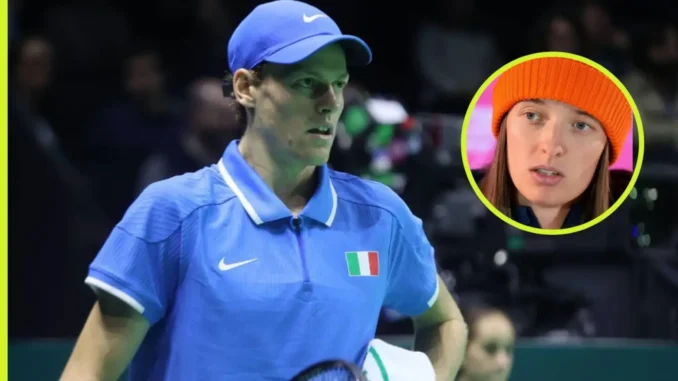
Jannik Sinner and Iga Swiatek have been caught up in drug scandals that have rocked tennis in 2024, but they have been given huge encouragement that their nightmares may soon be over.
Tennis was rocked by another doping case involving one of its most high-profile players after it was revealed Iga Swiatek has been given a one-month suspension after a positive test.
The Pole was ranked world No 1 when she provided a sample containing the angina medication trimetazidine in an out-of-competition test on August 12, with the way her case was handled sparking big concerns among players who received different treatment after they failed drug tests.
The International Tennis Integrity Agency declared both Sinner and Swiatek were ‘not responsible’ after they failed tests, but that was not the end of the story.
The World Anti-Doping Agency (WADA) have appealed against the decision and has called for Sinner to be handed a one to two-year suspension from tennis.
They may also consider an appeal against the Swiatek decision, yet it seems there is a feeling these high-profile doping cases in tennis are a result of improvements in testing rather than a major drug-taking problem in the sport.
Oliver Niggli, director of WADA, spoke about the Sinner and Swiatek cases during an interview with L’Equipe, as he hinted the players may be victims of improved technology after minuscule amounts of the banned substances were found in their systems.
“Today there is a problem of contamination,” said Niggli. “There are no more (doping cheats) than before, but laboratories are more efficient in detecting infinitesimal quantities of doping substances. We will have to open a working table to understand how to manage this situation.
“The quantities found are so small that it is possible to become contaminated by doing even trivial things.
“I understand the public, who thinks we are naive and that we believe everything. But the reality is different. There is a problem.
“If we wanted to simplify our lives, we could impose new thresholds and not find all these cases. But the real question is: Are we ready to accept microdosing? Where do we stop?
“With thresholds, we wouldn’t have seen all these cases. What we need to understand is whether we are ready to accept microdosing and where it is right to stop. A working table will be created precisely for this type of reflection.”
Those comments will encourage Sinner to believe he will not face further punishment when WADA’s case against him is heard at the Court of Arbitration for Sport in early 2025.
It also backs up the views of Ireland’s Davis Cup captain Conor Niland, who told this website that the tiny levels of a banned substance in Sinner’s system was not enough to suggest he was cheating.
Be the first to comment